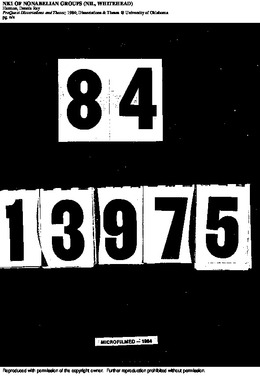| dc.contributor.author | Harmon, Dennis Ray, | en_US |
| dc.date.accessioned | 2013-08-16T12:29:01Z | |
| dc.date.available | 2013-08-16T12:29:01Z | |
| dc.date.issued | 1984 | en_US |
| dc.identifier.uri | https://hdl.handle.net/11244/5207 | |
| dc.description.abstract | Let Rng denote the category of associative rings with identity. A functor F: Rng (--->) Z-mod gives rise to another functor NF: Rng (--->) Z-mod defined as follows: NF(A) = ker (F(A{T}) (--->) F(A)) induced by the augmentation homomorphism t (--->) 0. By the work of H. Bass, A. Heller, R. Swan and D. Quillen, NK(, i)A vanishes for a regular ring A, i = 0,1,2. | en_US |
| dc.description.abstract | This technique can be extended to the case where G is a finite group (not necessarily abelian) of square-free order by first observing that NK(, i)ZG is a module over the Forbenium functor G(, 0)ZG. By T. -Y. Lam, NK(, i)ZG can then be computed in principle from NK(, i)ZH for its hyperelementary subgroups H. In particular, NK(, i)ZH vanishes for H a hyperelementary group of square-free order, i = 0,1 and thus NK(, i)ZG vanishes as well. | en_US |
| dc.description.abstract | R. Martin showed that NK(, i)ZG vanishes for G a finite abelian group of square-free order, i = 0,1 by utilizing Mayer-Vietoris exact sequences due to J. Milnor. | en_US |
| dc.format.extent | v, 21 leaves : | en_US |
| dc.subject | Mathematics. | en_US |
| dc.title | NK of nonabelian groups / | en_US |
| dc.type | Thesis | en_US |
| dc.thesis.degree | Ph.D. | en_US |
| dc.thesis.degreeDiscipline | Department of Mathematics | en_US |
| dc.note | Source: Dissertation Abstracts International, Volume: 45-03, Section: B, page: 0895. | en_US |
| ou.identifier | (UMI)AAI8413975 | en_US |
| ou.group | College of Arts and Sciences::Department of Mathematics | |
